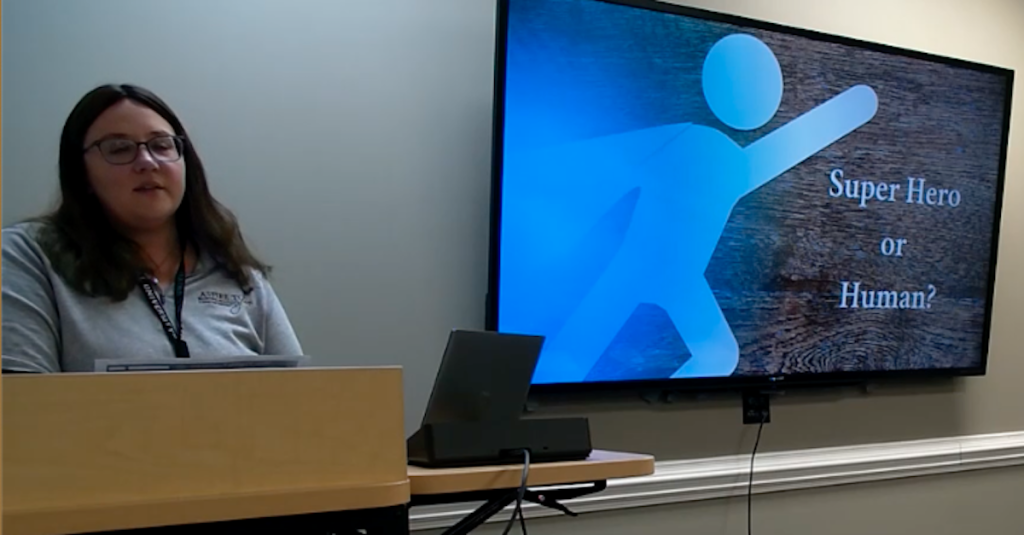First responder suicide rates outnumbering line-of-duty deaths
By Matt Young, WV Press Association
HUNTINGTON, W.Va. – “I need to drive this home – Suicide rates aren’t just outnumbering line-of-duty deaths – they’re doing so even with suicides being under-reported by as much as 60%.”
That’s what Kari Mika-Lude told the Joint Committee on Fire Departments and Emergency Medical Services in Huntington on Sunday, during the first day of the State Legislature’s May Interim Session.
Mika-Lude is the director of the W.Va. Behavioral Health Workforce and Health Equity Training Center at Marshall University. Mika-Lude is also the founder and CEO of Aspire to Inspire Behavioral Health and Addiction Services, as well as the co-founder of Code Grey, a stress-management training course. Mika-Lude delivered a presentation to the committee called “Supporting First Responder Wellness.”

“In 2017, in response to what my husband had experienced as a first responder, and what I had noticed throughout my career, we decided to develop a workshop called ‘Code Grey,’” Mika-Lude noted, before explaining that the name was inspired by the calling of a “code grey” in hospitals during an “urgent and potentially dangerous situation.”
“That describes our mission,” Mika-Lude said. “We believe that first responder-wellness has become a critical issue, and our objective is to assist with managing job-related stress, increasing mental wellness, and preventing suicide.”
“We need to attend to the needs of the helpers, but we need to do so proactively, rather than just reactively,” Mika-Lude added. We need to create a culture that de-stigmatizes stress and trauma responses, denormalizes overworking and the superhero mindset, and builds in healthy and trauma-sensitive workplace practices and sources of support.”
According to Mika-Lude, the Code Grey workshop has been held in numerous locations across West Virginia since its inception. Mika-Lude further added that, “While it can and has been presented to the workforce at large, we strongly recommend it for organizational leadership to ensure that the decision makers are part of the conversation. This has to be tackled systemically.”
At the conclusion of Mika-Lude’s remarks, W.Va. State Fire Marshal Kenneth Tyree briefly discussed how improvements of the Insurance Services Office (ISO) impacts community fire departments.
Tyree began by saying, “I am not an ISO expert, but I’ll share the things that I do know.”
“[ISO does] a fire-suppression rating schedule where they rate fire departments and how they are protecting our communities,” Tyree said.
Tyree explained that the ISO evaluates fire departments based upon four categories: emergency communications within the community; personnel operating procedures, equipment and training; flush (water) supply for the community; and community risk-reduction.
“It’s a 100-point scale, but they have as much as 105.5 points that they can achieve because of that community risk-reduction evaluation process,” Tyree said. “When we look at how it impacts a community, the first thing everyone has knowledge about is insurance premiums. It (the ISO rating) impacts insurance premiums. About 75% of the major insurance companies do take the ISO rating into consideration when it comes to lowering insurance premiums.”
According to Tyree, the ISO rating is a 10-point scale, with one being the highest possible score.
“When it comes to personnel operating procedures, equipment, and training – that’s 50 points of the 100-point scale,” Tyree noted. “Water supply is 40 points, but it’s probably the most impactful. If the water supply is not there, there is no leverage or consideration, or really anything that can be done to improve (the fire department) above 65 points.”
Lastly, the committee picked up where it left off during its April meeting by discussing the revised version of HB 3153 – a bill which seeks to redistribute certain taxes and surcharges for the benefit of first responders.
As explained by Committee Counsel Phillip Childs, “This bill creates consistency throughout the code where the Fire Protection Fund administered by the State Treasurer’s Office was administered inconsistently.”
“The other thing that the bill does is – it does not affect in any in any increasable way the Municipal Pensions Oversight Board, or Municipal Pensions, or Firefighter Pensions,” Childs added. “It increases a surcharge on counties with insurance premiums from 0.55% up to one-percent. That 0.45% will be split equally between the EMS Fund and the Fire Protection Fund, so it increases money to the Fire Protection Fund and also for the EMS Fund.”
At the conclusion of Childs’ explanation, the committee voted unanimously to recommend to both House Speaker Roger Hanshaw, R-Clay, and Senate President Craig Blair, R-Berkeley, that Gov. Jim Justice be encouraged to add HB 3153 to the agenda of any potential future Special Legislative Session that may be ordered.
The next meeting of the Joint Committee on Fire Departments and Emergency Medical Services is scheduled to occur during the Legislature’s August Interim Session.








